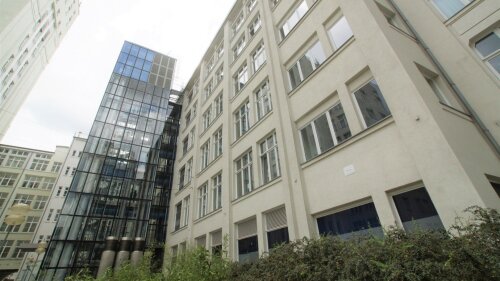
Focus ‘Business Optimization’
In addition to the general basics, in this focus you will acquire specialist knowledge and skills oriented towards particular perspectives in the industry. Here, very complex tasks are waiting to be solved in the best possible way. The long list of possible questions includes, for example:
- A certain part that is to be used in an aircraft should have certain mechanical and functional properties, but at the same time minimal weight in order to save fuel. What shape must the part have?
- A logistics company has thousands of orders to process and has to adhere to deadlines and many other restrictions. The costs and emissions are to be minimized. Which vehicle has to take which route?
- A company produces fruit yoghurt. On each of the three production lines, only one of the 23 varieties can be produced at the same time. Switching the variety requires the machine to be cleaned, which costs money. The company has to consider delivery dates, shelf life dates, ingredient stocks and many more things. What does an optimal production plan look like? When to change to which variety on which line?
Focus ‘Financial Engineering and Stochastics’
In addition to the general basics, in this focus you will learn skills and knowledge to solve problems from the world of finance and insurances. Many economic decisions have to be taken in an environment of uncertainty, as the development of relevant risk factors cannot be foreseen exactly. In this focus, you will gain in-depth knowledge of stochastic methods. Here are some problems that can be solved with the methods learned:
- Most businesses face market risks due to the fact that prices, interest rates and exchange rates are constantly changing. It is vital for them to assess the risks well and to take precautionary measures. Which market variables are particularly relevant for a company? How to model the development of risk factors with stochastic means and assess associated risks? How to conduct a stress test? Which are the methods that efficiently reduce risks?
- An insurance company wants to offer insurance cover against damage to solar panels. For this purpose, it must estimate the probabilities of damage. How can the damage be modelled stochastically? What is a fair premium for the insurance?
- When it comes to research on the internet, search engines such as Google are essential. A search engine aims to sort the web pages containing searched keywords according to the best possible criteria. The Markov chain theory helps to present search results in a fair ranking. How does this work?
- Optimum support: Lectures are delivered in front of small groups of students. This gives you the opportunity to come into direct contact with lecturers and also creates space for individual discussions and a family-like atmosphere.
- Excellent research: Priority areas include ‘complex systems’ as a University project, topics from analysis, stochastics, algebra and geometry, as well as gravitational-wave astronomy.
- Award-winning introductory phase of studies: In the first semesters, we support our students in many ways with the help of a concept consisting of classroom exercises in all courses, individual support in the ‘MatheCafé’External link and the annual exam preparation weekend.
- Possibilities without borders: Experience internationality! The University attracts students and scientists from all over the world with its appealing conditions and shapes Jena's character as a future-oriented and cosmopolitan city — ideal conditions for international prospective studentsmp4, 55 mb.
- Adventure abroad: If you dream of spending a semester abroad, you can easily make it come true. Our University has a worldwide network of partner universitiesExternal link.
-
University entrance qualification
A university entrance qualification, such as a general secondary school leaving certificate, is required for admission onto the study programme.
More information on university entrance qualifications can be found here.
-
Language requirements
Admission and language requirements for applicants of foreign nationality and without German Abitur: www.uni-jena.de/en/study-orientation-international
Ernst-Abbe-Platz 2
07743 Jena
Google Maps site planExternal link
Room 3329
Ernst-Abbe-Platz 2
07743 Jena
Google Maps site planExternal link
Room 3227
Ernst-Abbe-Platz 2
07743 Jena
Google Maps site planExternal link
University Main Building / SSZ
Fürstengraben 1
07743 Jena
Google Maps site planExternal link
Office hours:
We offer consultations in person, by telephone, and via Zoom. You can make an appointment by calling us on +49 3641 9-411111 (Mondays to Fridays from 9:00 to 11:00) or outside these office hours on +49 3641 9-411200. You can also use our remote help desk.
Consultation hours:
Mondays, Tuesdays, Thursdays and Fridays (9:00 to 12:20), Tuesdays (14:00 to 18:00), and Wednesdays and Thursdays (14:00 to 16:00).
Video chat: To the video chat – Zoom Videochat ZeitenMondays to Fridays (12:30 to 13:00) Password ZSB2020 Data protection informationpdf, 101 kb
University Main Building, Room E065
Fürstengraben 1
07743 Jena
Google Maps site planExternal link
Opening hours:
Mondays (10:00 – 12:00)
Tuesdays (13:00 – 15:00)
Wednesdays (10:00 – 12:00)
Thursdays (13:00 – 15:00)
Fridays (10:00 – 12:00)
You can also use our remote help desk at
www.uni-jena.de/service-ssz
or send us your enquiries by post.
Telephone hours:
Mondays to Fridays
(9:00 – 11:00)
Postal address:
Friedrich-Schiller-Universität Jena
Studierenden-Service-Zentrum
07737 Jena
University Main Building
Fürstengraben 1
07743 Jena
Google Maps site planExternal link



